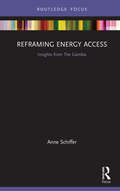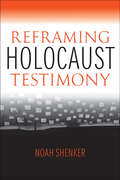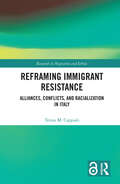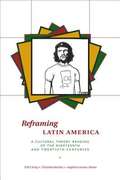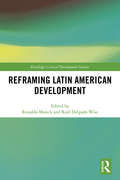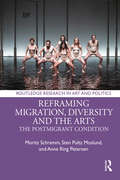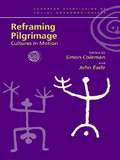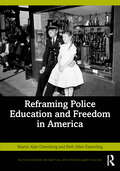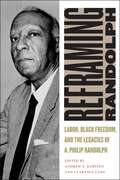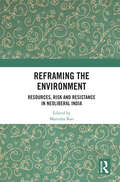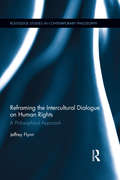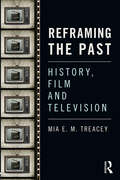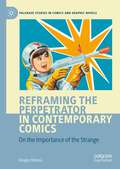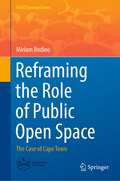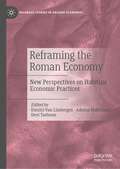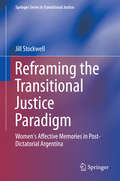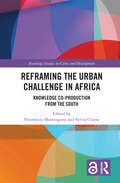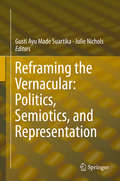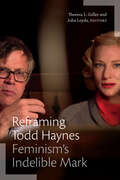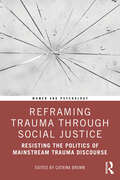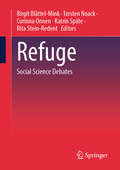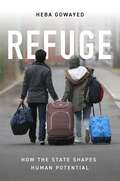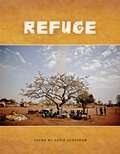- Table View
- List View
Reframing Energy Access: Insights from The Gambia (Routledge Focus on Environment and Sustainability)
by Anne SchifferThis book investigates energy access through the lens of everyday energy practices in the Gambian community of Kartong. Reframing Energy Access: Insights from The Gambia explores past, current and potential future modes of energy production and consumption to examine concepts such as energy leapfrogging and energy sufficiency. It argues that developments must be rooted in situated understanding of energy consumption to ensure sustainable and equitable access to modern energy services. Schiffer provides a uniquely long-term and holistic perspective into changing energy practices on the ground and the economic, political, environmental, technical and cultural factors that shape it. Translating insights of energy in The Gambian context into broader themes and recommendations, this book will be of great interest to policy makers, researchers and practitioners who work in the fields of energy access, energy policy, renewable energy transitions, as well as African and sustainable development in general.
Reframing Holocaust Testimony (The\modern Jewish Experience Ser.)
by Noah ShenkerInstitutions that have collected video testimonies from the few remaining Holocaust survivors are grappling with how to continue their mission to educate and commemorate. Noah Shenker calls attention to the ways that audiovisual testimonies of the Holocaust have been mediated by the institutional histories and practices of their respective archives. Shenker argues that testimonies are shaped not only by the encounter between interviewer and interviewee, but also by technical practices and the testimony process. He analyzes the ways in which interview questions, the framing of the camera, and curatorial and programming preferences impact how Holocaust testimony is molded, distributed, and received.
Reframing Immigrant Resistance: Alliances, Conflicts, and Racialization in Italy (Research in Migration and Ethnic Relations Series)
by Teresa CappialiThis book focuses on the political participation and grassroots mobilization of immigrants and racialized communities in the European context. Based on extensive data collected in Italy, it explores the role that alliances among pro-immigrant groups play in shaping political participation, asking why and how immigrant activists mobilize in hostile environments, why and how they create alliances with some white allies rather than others, and what might explain variations in forms of political participation and grassroots mobilization at the local level. Using social movement, critical race, and post-colonial theories, the author examines the ways in which both institutional and non-institutional actors, including immigrant activists, become involved and compete in the local arena over immigration and integration issues, and assesses the mechanisms by which both conventional and non-conventional forms of participation are made possible, or obstructed. By placing immigrant activists at the center of the analysis, the book offers a valuable and novel insider perspective on political activism and the claims-making of marginalized groups. It also demonstrates how pro-immigrant groups can play a role in racializing immigrant activists. A study of the effects on participation in social mobilization of coalitions, conflicts, and racialization processes among pro-immigrant groups and immigrant activists, this volume will appeal to scholars of sociology, political science, and political sociology with interests in migration, ethnic and racial relations, social movements, and local governance.
Reframing Latin America
by Erik Ching Christina Buckley Angélica Lozano-AlonsoProviding an extensive introduction to cultural studies in general, regardless of chronological or geographic focus, and presenting provocative, essential readings from Latin American writers of the last two centuries, Reframing Latin America brings much-needed accessibility to the concepts of cultural studies and postmodernism. From Saussure to semiotics, the authors begin by demystifying terminology, then guide readers through five identity constructs, including nation, race, and gender. The readings that follow are presented with insightful commentary and encompass such themes as "Civilized Folk Marry the Barbarians" (including José Martí's "Our America") and "Boom Goes the Literature: Magical Realism as the True Latin America?" (featuring Elena Garro's essay "It's the Fault of the Tlaxcaltecas"). Films such as Like Water for Chocolate are discussed in-depth as well. The result is a lively, interdisciplinary guide for theorists and novices alike.
Reframing Latin American Development (Routledge Critical Development Studies)
by Ronaldo Munck Raul Delgado WiseSince the year 2000 Latin America has been at the forefront of a series of diverse experiments with alternative forms, pathways and models of economic development and at the cutting edge of the international theoretical and political debates that surround these experiments. Reframing Latin American Development brings together leading scholars from Latin America and elsewhere to debate and discuss the current practice and futures of the Latin American experience with alternative forms of development over the last period and particularly since the end of neoliberal dominance. The models discussed range from the neo developmentalism approach of growth with equity, to the Buen Vivir (How to Live Well) philosophy advanced by the indigenous communities of the Andean highlands and implemented in the national development plans of the governments of Bolivia and Ecuador. Other models of alternative development include the so-called socialism of the twenty-first century and diverse proposals for constructing a social and solidarity economy and other models of local development based on the agency of community-based grassroots organizations and social movements. Reframing Latin American Development will be of particular interest to researchers, teachers and students in the fields of international development, Latin American studies and the economics, politics and sociology of development.
Reframing Migration, Diversity and the Arts: The Postmigrant Condition (Routledge Research in Art and Politics)
by Moritz Schramm Sten Pultz Moslund Anne Ring Petersen Mirjam Gebauer Hans Christian Post Sabrina Vitting-Seerup Frauke WiegandThis book offers a compelling study of contemporary developments in European migration studies and the representation of migration in the arts and cultural institutions. It introduces scholars and students to the new concept of ‘postmigration’, offering a review of the origin of the concept (in Berlin) and how it has taken on a variety of meanings and works in different ways within different national, cultural and disciplinary contexts. The authors explore postmigrant theory in relation to the visual arts, theater, film and literature as well as the representation of migration and cultural diversity in cultural institutions, offering case studies of postmigrant analyses of contemporary works of art from Europe (mainly Denmark, Germany and Great Britain).
Reframing Pilgrimage: Cultures in Motion
by Simon Coleman John EadeReframing Pilgrimage argues that sacred travel is just one of the twenty-first century's many forms of cultural mobility. The contributors consider the meanings of pilgrimage in Christian, Mormon, Hindu, Islamic and Sufi traditions, as well as in secular contexts, and they create a new theory of pilgrimage as a form of voluntary displacement. This voluntary displacement helps to constitute cultural meaning in a world constantly 'en route'. Pilgrimage, which works both on global economic and individual levels, is recognised as a highly creative and politically charged force intimately bound up in economic and cultural systems
Reframing Police Education and Freedom in America (Routledge Series on Practical and Evidence-Based Policing)
by Martin Alan Greenberg Beth Allen EasterlingThis book untangles the components of police education and advocates a robust community-based training model with significant civilian oversight. The recommended approach recognizes that the citizenry needs to be included in the provision of basic police education, for it is they who must both support and be served by their police. The police must be role models for society, demonstrating that freedom and rights come with obligations, both to the community as a whole and to individuals in need within that community. Ultimately, the quality of police training and the public’s safety depend not only on the leadership of police executives as well as the quality of educational institutions and police candidates but also on the building of a community’s trust in its police.The issues of police recruitment, education, and retention have greater consequence in an era when protests and other signs of negativity surround law enforcement. Several incidents, including, most notably, George Floyd’s murder by police, have sparked new training initiatives regarding police de-escalation and community engagement. At the same time, the proliferation of gun violence and a contentious political climate have led some officers to refrain from undertaking proactive types of policing. In this context, reform of the police education system is urgent. This book examines police training at all levels of government—local, regional, state, and federal. In addition, citizen participation programs, including the role of the media and programs for furthering law-related education (LRE), are highlighted. The proposed police education model recognizes that ordinary members of the American public need to contribute to the provision of basic police education, for it is they who must both support and be served by their police. The focus is on teaching a "guardian style" of policing at the local level. Police education would combine higher education, necessary practical proficiencies, and intensive field experiences through a gradual level of greater responsibility—likely extending over a 2-plus-year period for trainees with less than a year of previous college credits.This book will be of interest to a wide range of audiences such as law enforcement professionals and trainers, including those in executive development programs in police departments; community leaders, scholars, and policy experts who specialize in policing; concerned citizens; and students of criminal justice, especially those interested in police organization and management, criminal justice policy, and the historical development of police.
Reframing Randolph: Labor, Black Freedom, and the Legacies of A. Philip Randolph (Culture, Labor, History #12)
by Andrew E. Kersten Clarence LangAtone time, Asa Philip Randolph (1889-1979) was a household name. As president ofthe all-black Brotherhood of Sleeping Car Porters (BSCP), he was an embodimentof America’s multifaceted radical tradition, a leading spokesman for BlackAmerica, and a potent symbol of trade unionism and civil rights agitation fornearly half a century. But with the dissolution of the BSCP in the 1970s, theassaults waged against organized labor in the 1980s, and the overall silencingof labor history in U.S. popular discourse, he has been largely forgotten amonglarge segments of the general public before whom he once loomed so large.Historians, however, have not only continued to focus on Randolph himself, buthis role (either direct, or via his legacy) in a wide range of social,political, cultural, and even religious milieu and movements. The authors of Reframing Randolph have taken Randolph’s dusty portrait down fromthe wall to reexamine and reframe it, allowing scholars to regard him in new,and often competing, lights. This collection of essays gathers, for the veryfirst time, many genres of perspectives on Randolph. Featuring both establishedand emergent intellectual voices, this project seeks to avoid both hagiographyand blanket condemnation alike. The contributors represent the diverse waysthat historians have approached the importance of his long and complex careerin the main political, social, and cultural currents of twentieth-centuryAfrican American specifically, and twentieth-century U.S. history overall. Thecentral goal of Reframing Randolph isto achieve a combination of synthetic and critical reappraisal.
Reframing the Environment: Resources, Risk and Resistance in Neoliberal India
by Manisha RaoThis volume unravels the underlying power relations that are masked in the present discourse of ecological sustainability and conflicts over natural resources. Current discussions on environment emphasise the use and abuse of the environment in various ways. This book looks at the inter-linkages of discourse, resources, risk and resistance in the contemporary neoliberal world. While exploring the experiences of neoliberalisation of nature in India, it brings out the intersections of conservation and management, science and gender, community politics and governance policies. The volume highlights the cultural politics of resistance from multiple sites and regions in India in the recent context (be it land, water, forest, flora or fauna or urban commons). It discusses the ways in which environmental issues have come up and been appropriated, while examining the role of the State and actors such as corporates, traders, consultants, ecotourism companies, green activists and consumers, and consequences of ‘green’ appropriation and the ‘growth’ story. The major themes of the volume are the interrelations of nature, culture and power; neoliberal governance and the environment; access to and use and management of land, natural resources and environment; community politics and livelihoods; marginalised groups and local communities; marketisation and the environment; and new forms of re-appropriation and resistance. This book will be of great interest to students and researchers in sociology, environmental studies, environmental history, environmental anthropology, political ecology, political science, geography, law and human rights, economics and development studies as well as to environmental activists, policy makers and those in media and journalism.
Reframing the Intercultural Dialogue on Human Rights: A Philosophical Approach (Routledge Studies in Contemporary Philosophy)
by Jeffrey FlynnIn this book, Flynn stresses the vital role of intercultural dialogue in developing a non-ethnocentric conception of human rights. He argues that Jürgen Habermas’s discourse theory provides both the best framework for such dialogue and a much-needed middle path between philosophical approaches that derive human rights from a single foundational source and those that support multiple foundations for human rights (Charles Taylor, John Rawls, and various Rawlsians). By analyzing the historical and political context for debates over the compatibility of human rights with Christianity, Islam, and "Asian Values," Flynn develops a philosophical approach that is continuous with and a critical reflection on the intercultural dialogue on human rights. He reframes the dialogue by situating it in relation to the globalization of modern institutions and by arguing that such dialogue must address issues like the legacy of colonialism and global inequality while also being attuned to actual political struggles for human rights.
Reframing the Past: History, Film and Television
by Mia E. TreaceyReframing the Past traces what historians have written about film and television from 1898 until the early 2000s. Mia Treacey argues that historical engagement with film and television should be reconceptualised as Screened History: an interdisciplinary, international field of research to incorporate and replace what has been known as ‘History and Film’. It draws from the fields of Film, Television and Cultural Studies to critically analyse key works and connect past scholarship with contemporary research. Reconsidered as Screened History, the works of Pierre Sorlin, Marc Ferro, John O’Connor, Robert Rosenstone and Robert Toplin are explored alongside lesser known but equally important contributions. This book identifies a number of common themes and ideas that have been explored by historians for decades: the use of history on film and television as a way to teach the past; the challenge of filmic and televisual history to more traditional historiography; and an ongoing battle to find an ‘appropriate’ historical way to engage with Film Studies and Theory. Screened History offers an approach to exploring History, Film and Television that allows room for future developments, while connecting them to a rich and diverse body of past scholarship. Combining a narrative of historical research on film and television over the past century with a reconceptualisation of the field as Screened History, Reframing the Past is essential reading both for established scholars of History and Film, Film History and other related disciplines, and to students new to the field.
Reframing the Perpetrator in Contemporary Comics: On the Importance of the Strange (Palgrave Studies in Comics and Graphic Novels)
by Dragoș ManeaThis book foregrounds the figure of the perpetrator in a selection of British, American, and Canadian comics and explores questions related to remembrance, justice, and historical debt. Its primary focus is on works that deliberately estrange the figure of the perpetrator—through fantasy, absurdism, formal ambiguity, or provocative rewriting—and thus allow readers to engage anew with the history of genocide, mass murder, and sexual violence. This book is particularly interested in the ethical space such an engagement calls into being: in its ability to allow us to ponder the privilege many of us now enjoy, the gross historical injustices that have secured it, and the debt we owe to people long dead.
Reframing the Role of Public Open Space: The Case of Cape Town (PoliTO Springer Series)
by Miriam BodinoThis book explores the growing spatial inequality in contemporary cities, and the opportunity of reframing the role of public open space as a tool of inclusion in a context of an increasing economic gap between the urban poor and rich. The first part outlines the geographical and theoretical frames of reference, which are then tested in the analysis of a case study: Cape Town. This city in South Africa was selected since its spatial aspects of separation are particularly evident due to the legacy of both apartheid and modernism. The examination of the policies of the City of Cape Town confirms the rising attention to public space since the 1990s. This slow progress of desegregation is tested through a critical study of one of the most disadvantaged areas of the city, Khayelitsha. The book explores the relevance and impact of an urban-design project, and reframes the role of public open space not only as a tool for restructuring the apartheid city, but also for reinterpreting other fragmented contemporary cities.
Reframing the Roman Economy: New Perspectives on Habitual Economic Practices (Palgrave Studies in Ancient Economies)
by Dimitri Van Limbergen Adeline Hoffelinck Devi TaelmanThis book focuses on those features of the Roman economy that are less traceable in text and archaeology, and as a consequence remain largely underexplored in contemporary scholarship. By reincorporating, for the first time, these long-obscured practices in mainstream scholarly discourses, this book offers a more complete and balanced view of an economic system that for too long has mostly been studied through its macro-economic and large-scale – and thus archaeologically and textually omnipresent – aspects. The topic is approached in five thematic sections, covering unusual actors and perspectives, unusual places of production, exigent landscapes of exploitation, less-visible products and artefacts, and divergent views on emblematic economic spheres. To this purpose, the book brings together a select group of leading scholars and promising early career researchers in archaeology and ancient economic history, well positioned to steer this ill-developed but fundamental field of the Roman economy in promising new directions.
Reframing the Transitional Justice Paradigm
by Jill StockwellThis volume explores the evolving and complex memorial consequences of state-sponsored violence in post-dictatorial Argentina. Specifically, it looks at the power and significance of personal emotions and affects in shaping memorial culture. This volume contends that we need to look beyond political and ideological contestations to a deeper level of how memorial cultures are formed and sustained. It argues that we cannot account for the politics of memory in modern-day Argentina without acknowledging and exploring the role played by individual emotions and affects in generating and shaping collective emotions and affects. Drawing from direct testimony from Argentinian women who have experienced political and physical violence, the research in this volume aims at understanding how their memories may be a different source of insight into the deep animosities within and between Argentine memorial cultures. In direct contrast to the nominally objective and universalist sensibility that traditionally has driven transitional justice endeavours, this volume examines how affective memories of trauma are a potentially disruptive power within the reconciliation paradigm--and thus affect should be taken into account when considering transitional justice. Accordingly, Cultures of Remembrance for Women in Post-Dictatorial Argentina is an excellent resource for those interested in human rights, transitional justice, clinical psychology and social work, and Latin American conflicts.
Reframing the Urban Challenge in Africa: Knowledge Co-production from the South (Routledge Studies in Cities and Development)
by Ntombini Marrengane Sylvia CroeseThis book explores the changing dynamics and challenges behind the rapid expanse of Africa’s urban population. Africa’s urban age is underway. With the world’s fastest growing urban population, the continent is rapidly transforming from one that is largely rural, to one that is largely urban. Often facing limited budgets, those tasked with managing African cities require empirical evidence on the nature of demands for infrastructure, escalating environmental hazards, and ever-expanding informal settlements. Drawing on the work of the African Urban Research Initiative, this book brings together contributions from local researchers investigating key themes and challenges within their own contexts. An important example of urban knowledge coproduction, the book demonstrates the regional diversity that can be seen as the main feature of African urbanism, with even well-accepted concepts such as informality manifesting in markedly different ways from place to place. Providing an important nuanced perspective on the heterogeneity of African cities and the challenges they face, this book will be an important resource for researchers across development studies, African studies, and urban studies.
Reframing the Vernacular: Politics, Semiotics, and Representation
by Gusti Ayu Made Suartika Julie NicholsThe aim of this book is to reflect on ''vernacularity'' and culture. It concentrates on two major domains: first it attempts to reframe our understanding of vernacularity by addressing the subject in the context of globalisation, cross-disciplinarity, and development, and second, it discusses the phenomenon of how vernacularity has been treated, used, employed, manipulated, practiced, maintained, learned, reconstructed, preserved and conserved, at the level of individual and community experience. Scholars from a wide variety of knowledge fields have participated in enriching and engaging discussions, as to how both domains can be addressed. To expedite these aims, this book adopts the theme "Reframing the Vernacular: Politics, Semiotics, and Representation",organised around the following major sub-themes: • Transformation in the vernacular built environment • Vernacular architecture and representation • The meaning of home • Symbolic intervention and interpretation of vernacularity • The semiotics of place • The politics of ethnicity and settlement • Global tourism and its impacts on vernacular settlement • Vernacular built form and aesthetics • Technology and construction in vernacular built forms • Vernacular language - writing and oral traditions
Reframing Todd Haynes: Feminism’s Indelible Mark (a Camera Obscura book)
by Theresa L. Geller and Julia LeydaFor three decades, award-winning independent filmmaker Todd Haynes, who emerged in the early 1990s as a foundational figure in New Queer Cinema, has gained critical recognition for his outsider perspective. Today, Haynes is widely known for bringing women’s stories to the screen. Analyzing Haynes’s films including Safe (1995), Velvet Goldmine (1998), Far from Heaven (2002), and Carol (2015), as well as his unauthorized Karen Carpenter biopic, Superstar (1987), and the television miniseries Mildred Pierce (2011), the contributors to Reframing Todd Haynes reassess his work in light of his long-standing feminist commitments and his exceptional career as a director of women’s films. They present multiple perspectives on Haynes’s film and television work and on his role as an artist-activist who draws on academic theorizations of gender and cinema. The volume illustrates the influence of feminist theory on Haynes’s aesthetic vision, most evident in his persistent interest in the political and formal possibilities afforded by the genre of the woman’s film. The contributors contend that no consideration of Haynes’s work can afford to ignore the crucial place of feminism within it.Contributors. Danielle Bouchard, Nick Davis, Jigna Desai, Mary R. Desjardins, Patrick Flanery, Theresa L. Geller, Rebecca M. Gordon, Jess Issacharoff, Lynne Joyrich, Bridget Kies, Julia Leyda, David E. Maynard, Noah A. Tsika, Patricia White, Sharon Willis
Reframing Trauma Through Social Justice: Resisting the Politics of Mainstream Trauma Discourse (Women and Psychology)
by Catrina BrownThis cross-disciplinary volume examines and reframes trauma as a social and political issue in the context of wider society, critiquing the widely accepted pathologizing of trauma and violence in current discourse.Rooted in critical social theory, this insightful text reinvokes the critiques and analysis of the women’s movement and the "personal is political" framing of trauma to unpack the mainstreaming of trauma discourse which has emerged today. Accomplished contributors address the social construction of femininity and masculinity in relation to trauma and violence, and advocate for a broader framing of trauma away from the constrained focus on pathologizing and diagnosing trauma, individual psychologizing and therapy. Instead, the book offers a fresh and compelling look at how discursive resistance, alternative feminist and narrative approaches to emotional distress and the mental health effects of violence can be developed alongside community-based, preventive, political and policy-based actions to create effective shifts in discourse, practice, policy and programming.This is fascinating reading for upper-level undergraduate and postgraduate students, researchers and academics in a broad range of fields of study, including psychology, social work, gender and women’s studies and sociology, as well as for professionals, including policy makers, clinical psychologists and social workers.
Reframing Visual Social Science
by Luc PauwelsThe burgeoning field of 'visual social science' is rooted in the idea that valid scientific insight into culture and society can be acquired by observing, analyzing and theorizing its visual manifestations: visible behavior of people and material products of culture. Reframing Visual Social Science provides a well-balanced, critical-constructive and systematic overview of existing and emerging modes of visual social and cultural research. The book includes integrated models and conceptual frameworks, analytical approaches to scrutinizing existing imagery and multimodal phenomena, a systematic presentation of more active ways and formats of visual scholarly production and communication, and a number of case studies which exemplify the broad fields of application. Finally, visual social research is situated within a wider perspective by addressing the issue of ethics; by presenting a generic approach to producing, selecting and using visual representations; and through discussing the specific challenges and opportunities of a 'more visual' social science.
Refuge: Social Science Debates
by Birgit Blättel-Mink Torsten Noack Corinna Onnen Katrin Späte Rita Stein-RedentThe welcome culture of 2015 in Germany has, not least due to the (re)definition of safe countries of origin, turned into a deportation policy. How can this change in policy be understood and is it also accompanied by a change of attitude among the population? Which reasons for and which reasons against the admission of refugees are cited in social debates? This volume brings together analyses of the social discourse on dealing with refugees, questions of labour market integration and the practice of counselling refugees. Alongside academic analyses are reflective contributions from the practice of migration policy.With contributions by Olaf Struck.- David Stiller.- Helge Döring and Sebastian Kurtenbach.- Ann-Christine Lill, Janis Schneider and Sam Schneider.- Kirsten Hoesch. - Kathrin Weis.- Theresa Köhler and Kerstin Ettl.- Doris Beer.- André Pohlmann.- Katharina Resch, Gertraud Kremsner, Michelle Proyer, Camilla Pellech, Regina Studener-Kuras and Gottfried Biewe.The editors: Prof. Dr. Birgit Blättel-Mink is Professor of Sociology with a focus on industrial and organizational sociology at the Goethe University in Frankfurt/Main. Torsten Noack, M.A. Sociology, Head of the School for Work Education of the International Federation Stuttgart. Prof. Dr. Corinna Onnen is university professor for general sociology at the University of Vechta. Dr. Katrin Späte works at the Institute for Sociology at the University of Münster. Apl. Prof. Dr. Rita Stein-Redent works at the University of Vechta.
Refuge: How the State Shapes Human Potential
by Heba GowayedHow states deny the full potential of refugees as people and perpetuate social inequalityAs the world confronts the largest refugee crisis since World War II, wealthy countries are being called upon to open their doors to the displaced, with the assumption that this will restore their prospects for a bright future. Refuge follows Syrians who fled a brutal war in their homeland as they attempt to rebuild in countries of resettlement and asylum. Their experiences reveal that these destination countries are not saviors; they can deny newcomers’ potential by failing to recognize their abilities and invest in the tools they need to prosper.Heba Gowayed spent three years documenting the strikingly divergent journeys of Syrian families from similar economic and social backgrounds during their crucial first years of resettlement in the United States and Canada and asylum in Germany. All three countries offer a legal solution to displacement, while simultaneously minoritizing newcomers through policies that fail to recognize their histories, aspirations, and personhood. The United States stands out for its emphasis on “self-sufficiency” that integrates refugees into American poverty, which, by design, is populated by people of color and marked by stagnation. Gowayed argues that refugee human capital is less an attribute of newcomers than a product of the same racist welfare systems that have long shaped the contours of national belonging.Centering the human experience of displacement, Refuge shines needed light on how countries structure the potential of people, new arrivals or otherwise, within their borders.
Refuge (American Poets Continuum)
by Adrie KusserowDeeply cross cultural, humanitarian, political and global poems about how humans deal with suffering across the world. These are poems about cultures rubbing up against each other, war, refugees, child soldiers, spiritual refugees trying to find a home, and a mother who is witnessing these firsthand. Rare ethnographic poetry by a world traveling cultural anthropologist and human rights activist.
Refuge
by Adrie KusserowDeeply cross cultural, humanitarian, political and global poems about how humans deal with suffering across the world. These are poems about cultures rubbing up against each other, war, refugees, child soldiers, spiritual refugees trying to find a home, and a mother who is witnessing these firsthand. Rare ethnographic poetry by a world traveling cultural anthropologist and human rights activist.
